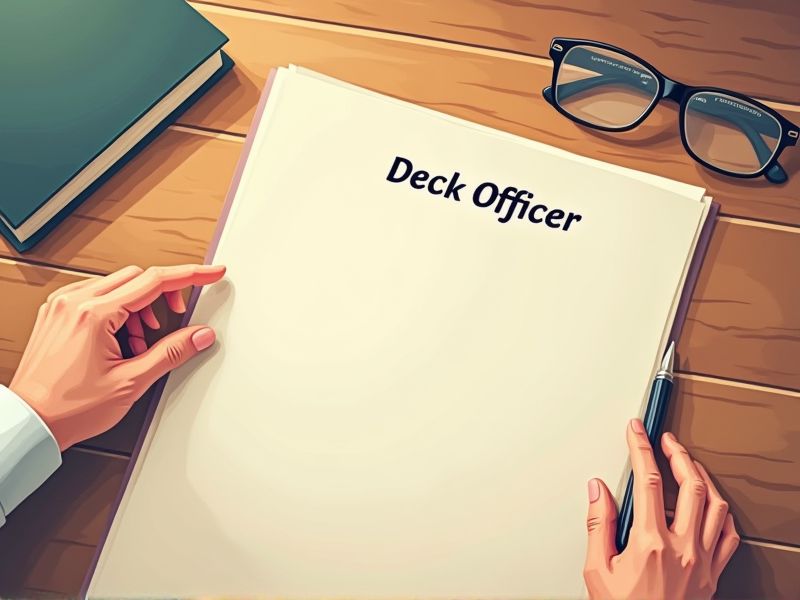
A deck officer plays a critical role in maritime operations, ensuring the safety and efficiency of a ship's voyage. Certification provides the necessary knowledge and skills to handle complex navigational and operational tasks. Regulatory bodies require these certifications to verify competency and adherence to international maritime standards. Below are key certifications essential for a career as a deck officer.
Certificate of Competency (Deck Officer)
The Certificate of Competency for a Deck Officer is essential because it verifies the holder's proficiency in navigational skills and safety procedures. Without this certification, a Deck Officer cannot legally perform duties on board vessels, limiting their career opportunities. The issuance of such certificates ensures compliance with international maritime standards, which is crucial for safe and efficient sea operations. Renewal of these certificates often involves continued education and assessments, reinforcing skills and knowledge critical to the role.
STCW Basic Safety Training
The International Maritime Organization mandates STCW Basic Safety Training for Deck Officers to ensure standardized global maritime safety. Without this training, Deck Officers may lack essential skills in personal survival techniques and emergency response, compromising vessel safety. Proper safety training helps in preventing accidents and mitigating risks at sea. Compliance with STCW standards enhances the officer's competency and credibility in their maritime career.
GMDSS Certification
GMDSS Certification equips deck officers with the necessary skills to efficiently handle distress and safety communications at sea. International maritime regulations mandate GMDSS compliance to ensure the safety and wellbeing of crew members and passengers. Proficiency in GMDSS systems allows deck officers to effectively manage emergency situations and support search and rescue operations. Furthermore, a GMDSS Certification enhances a deck officer's qualifications, expanding career opportunities within the maritime industry.
Proficiency in Survival Craft and Rescue Boats
Proficiency in Survival Craft and Rescue Boats is crucial for a Deck Officer due to the responsibility of ensuring the safety of all personnel onboard during emergencies at sea. Comprehensive training enables the officer to efficiently launch and manage lifeboats and rescue operations, reducing response time in critical situations. Understanding the operation of these crafts aids in compliance with International Maritime Organization regulations, which set the safety standards for ship operations. Knowledge in this area enhances the overall preparedness and confidence of the crew, leading to more effective teamwork and crisis management.
Advanced Fire Fighting Certification
Advanced Fire Fighting Certification equips a deck officer with the skills to manage and mitigate fire emergencies on board, which directly enhances crew and vessel safety. The complex nature of fire hazards at sea requires specialized training to effectively handle different scenarios. This certification is a regulatory requirement under the Standards of Training, Certification, and Watchkeeping (STCW) to ensure compliance with international maritime safety norms. Possessing such certification boosts a deck officer's career prospects by meeting the criteria for higher responsibility roles in maritime operations.
Medical First Aid Certification
Medical first aid certification is necessary for deck officers to ensure they can provide initial care in medical emergencies until professional help is available, reducing the risk of fatalities at sea. The remote environment of a ship increases the likelihood that a deck officer will be the first responder, requiring them to manage medical crises effectively. Regulatory bodies mandate such certification to comply with international safety standards, promoting a safer working environment. Knowledge of first aid procedures empowers deck officers to address common maritime injuries, maintaining crew health and operational efficiency.
Bridge Resource Management (BRM)
Bridge Resource Management (BRM) enhances the safety of vessel operations by ensuring that deck officers effectively communicate and collaborate. The practice of BRM reduces the likelihood of human errors, which are responsible for a significant number of maritime incidents. It trains officers to recognize and respond to potential navigational hazards by fostering situational awareness. Effective BRM fosters a structured environment where decision-making is unified and efficient, leading to improved overall voyage safety.
Ship Security Officer (SSO) Certification
The Ship Security Officer (SSO) Certification ensures deck officers can effectively manage and implement a vessel's security plan, which is crucial in protecting against maritime threats. Compliance with international maritime regulations like the International Ship and Port Facility Security (ISPS) Code becomes mandatory for ships engaged in international trade. Having this certification equips deck officers with the necessary skills to conduct security assessments, audits, and drills, enhancing the vessel's overall safety. The presence of an SSO-certified officer boosts crew confidence, knowing there is someone capable of handling security incidents or threats efficiently.
Radar Observer/ARPA Certification
The Radar Observer/ARPA Certification equips deck officers with the skills to accurately interpret radar data, crucial for safe navigation and collision avoidance. Poor radar usage can lead to maritime accidents, so certification ensures standardized proficiency across personnel. As technology advances, ARPA systems provide automated radar plotting, enhancing situational awareness for deck officers. Regulatory bodies often require this certification to align with international safety standards like those set by the International Maritime Organization (IMO).
Maritime Law Awareness Certification
A Deck Officer with Maritime Law Awareness Certification better navigates legal complexities encountered at sea, reducing liability risks. Certification ensures officers comply with international regulations, fostering safer and more efficient operations. Understanding maritime law enhances dispute resolution capabilities, contributing to smoother port and cargo operations. Certification often leads to career advancement as companies value officers with legal knowledge relevant to maritime operations.
Summary
When you obtain additional certifications as a Deck Officer, your career opportunities can broaden significantly. These credentials often lead to promotions and higher salary prospects within the maritime industry. Your enhanced skills and knowledge improve your ability to manage navigation and safety procedures more effectively. Increased job satisfaction and security are common outcomes as your expertise becomes more recognized and valued.
